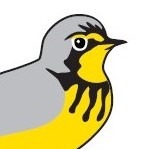By Denise Maillet (New Brunswick Piping Plover Project Coordinator, Bird Studies Canada) and Jennifer White (New Brunswick & PEI Stewardship Coordinator, Nature Conservancy of Canada)

Photo: Jennifer White
On a sunny day in October, 47 students and 4 teachers from Ecole Calixte F. Savoie in Saint-Anne de Kent, NB got some hands-on experience in helping and learning about nature. They joined Denise Maillet of Bird Studies Canada, as well as Denise Roy and Jennifer White of the Nature Conservancy of Canada (NCC), to clean up a section along Cap Lumiere beach.
This beach is part of NCC’s Richibucto Dunes Nature Reserve. The reserve exists to protect sensitive beaches, dunes, saltmarsh, and freshwater wetland habitat, as well as to support species at risk such as Beach Pinweed, Red Knot, and Piping Plover.
Students and teachers from grades three to eight joined in the effort to clean a 1-km stretch of beach habitat. A total of 120 pounds of garbage was removed, including 37 pieces of polystyrene, 10 buoys, and 50 feet of rope! Other items that could have harmed birds and other wildlife included: bottle tops, plastic bags, fishing line, and glass. The beaches were much safer for humans and wildlife after this event.
Students also had time to learn about and observe birds and other wildlife, including shorebirds, racoons, fox and moose tracks, a dead cormorant, and over 300 Grey Seals. The team turned into wildlife rescuers when they helped staff carefully remove three Rock Crabs trapped in abandoned lobster traps located along the shoreline. To top it all off, students used their imaginations to look and feel for interesting rocks, shells, and sponges while creating sand sculptures on the beach – it doesn’t get much better than that!
Although visitors to Cap Lumiere have been making efforts to clean up some garbage along the beach, problems with litter and vehicle traffic remain. Bird Studies Canada and NCC are engaging in conversations with the local community with the aim of raising awareness about the sensitivity of plover nests and the fragile nature of dunes. We are also building relationships within the community so that we can work together to find solutions.
If trends continue, we will continue to see major changes in garbage dumping. With continued support from partners and donors, we hope to see a decrease in vehicle use on beaches that, combined with a reduction in garbage, will result in healthy habitat and wildlife including Piping Plovers at Cap Lumiere beach and a strong, supportive dune system that will protect the community behind the dune for years to come.
This project had incredibly supportive partners and donors. Bird Studies Canada and NCC would like to thank all who helped by providing equipment and supplies including: Ménage ton Rivage, Irving Eco-Centre in Bouctouche, and the Pays de Cocagne Sustainable Development Group Inc. We would also like to thank our generous funders: the Government of Canada’s Habitat Stewardship Program for Species at Risk, the NB Environmental Trust Fund, NB Wildlife Trust Fund, Environment and Climate Change Canada, and the TD Friends of the Environment Foundation.

